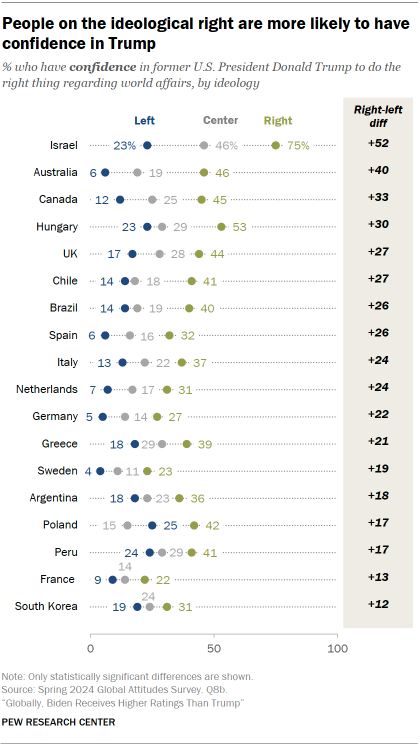Though confidence in U.S. President Joe Biden has declined in recent years, even fewer people have confidence in former U.S. President Donald Trump to do the right thing regarding world affairs.
Across 34 countries surveyed, a median of 28% are confident in Trump; 69% are not. (The survey was conducted before Trump’s conviction in a state criminal trial in New York.)
Majorities in Canada and across Europe say they have no confidence in Trump. More than eight-in-ten adults hold this view in France, Germany and Sweden.
Trump also receives poor assessments in Latin America, where at least six-in-ten in every country surveyed – including 86% in Mexico – do not have confidence in him to do the right thing in world affairs.
There are more varied views of Trump in other regions of the world. Roughly half or more in Ghana, Israel, Kenya, Nigeria, the Philippines and Thailand express confidence in him. But large majorities in a few Asia-Pacific countries do not, including 79% in Australia. And in the Middle East-North Africa region, large majorities in Tunisia and Turkey view him negatively.
Trump was in office at the start of the COVID-19 pandemic, and confidence in him was especially low in several countries at that time. Since then, views of Trump have improved in a few places.
For example, 20% of Canadians had confidence in Trump in 2020, compared with 30% today. Similar increases can be seen in Italy and the UK.
Hungary and Tunisia are the only countries surveyed where confidence in Trump is substantially higher than confidence in Biden, though ratings for both leaders are still largely negative there.
In some nations, the difference in views of the two U.S. presidents is very large. For example, 63% of Germans trust Biden, but only 15% trust Trump – a difference of nearly 50 percentage points.
Ideological and gender differences

In 18 of the 28 countries where political ideology is measured, people on the right are more likely than those on the left to trust Trump’s handling of world affairs.
The divide is particularly large in Israel, where adults on the right are roughly three times more likely than those on the left to have confidence in the former U.S. president.
But differences of 20 points or more can be seen in several other countries. For example, 46% of Australians on the right have confidence in Trump, compared with only 6% of those on the left.
Views of Trump also differ by gender. In many countries, men are more likely than women to express confidence in Trump.
Throughout much of Europe, men are about twice as likely as women to trust the former U.S. president, though confidence in Trump is relatively low among both groups. In the Netherlands, for example, 31% of men and 12% of women trust Trump to do the right thing in world affairs. It’s worth noting that, in many countries, women are less likely than men to answer this question at all.




